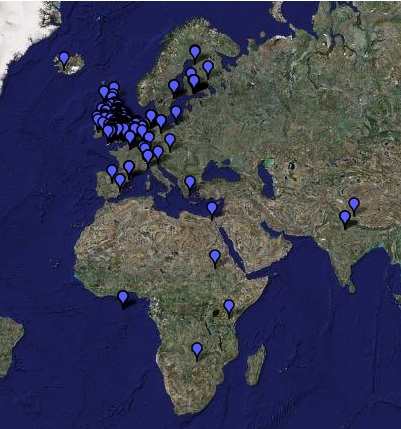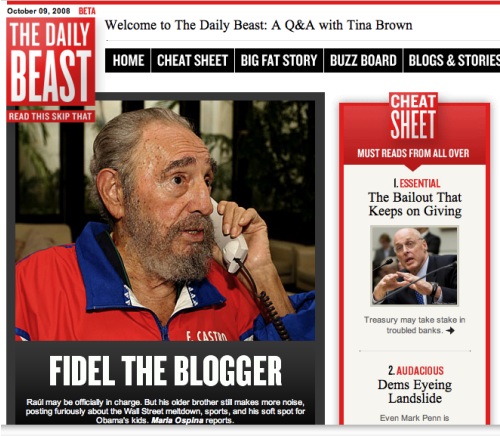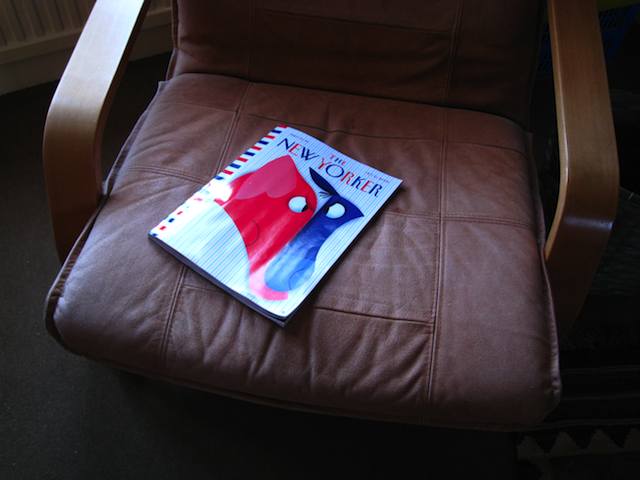There’s a memorable, beautifully-written editorial in the current New Yorker which perfectly encapsulates the choice facing Americans. It concludes:
The exhaustingly, sometimes infuriatingly long campaign of 2008 (and 2007) has had at least one virtue: it has demonstrated that Obama’s intelligence and steady temperament are not just figments of the writer’s craft. He has made mistakes, to be sure. (His failure to accept McCain’s imaginative proposal for a series of unmediated joint appearances was among them.) But, on the whole, his campaign has been marked by patience, planning, discipline, organization, technological proficiency, and strategic astuteness. Obama has often looked two or three moves ahead, relatively impervious to the permanent hysteria of the hourly news cycle and the cable-news shouters. And when crisis has struck, as it did when the divisive antics of his ex-pastor threatened to bring down his campaign, he has proved equal to the moment, rescuing himself with a speech that not only drew the poison but also demonstrated a profound respect for the electorate. Although his opponents have tried to attack him as a man of “mere” words, Obama has returned eloquence to its essential place in American politics. The choice between experience and eloquence is a false one––something that Lincoln, out of office after a single term in Congress, proved in his own campaign of political and national renewal. Obama’s “mere” speeches on everything from the economy and foreign affairs to race have been at the center of his campaign and its success; if he wins, his eloquence will be central to his ability to govern.
We cannot expect one man to heal every wound, to solve every major crisis of policy. So much of the Presidency, as they say, is a matter of waking up in the morning and trying to drink from a fire hydrant. In the quiet of the Oval Office, the noise of immediate demands can be deafening. And yet Obama has precisely the temperament to shut out the noise when necessary and concentrate on the essential. The election of Obama—a man of mixed ethnicity, at once comfortable in the world and utterly representative of twenty-first-century America—would, at a stroke, reverse our country’s image abroad and refresh its spirit at home. His ascendance to the Presidency would be a symbolic culmination of the civil- and voting-rights acts of the nineteen-sixties and the century-long struggles for equality that preceded them. It could not help but say something encouraging, even exhilarating, about the country, about its dedication to tolerance and inclusiveness, about its fidelity, after all, to the values it proclaims in its textbooks. At a moment of economic calamity, international perplexity, political failure, and battered morale, America needs both uplift and realism, both change and steadiness. It needs a leader temperamentally, intellectually, and emotionally attuned to the complexities of our troubled globe. That leader’s name is Barack Obama.
Elsewhere in the same issue, James Wood has a nice piece about the way the McCain camp has portrayed Obama’s literary and oratorical skills as ‘evidence’ of a character flaw. And then, of course, there’s Palin:
Hearing her being interviewed by Sean Hannity, on Fox News, almost made one wish for a Republican victory in November, so that her bizarre locutions might be available a bit longer to delve into. At times, even Hannity looked taken aback; his eyes, slightly too close to each other, like the headlamps on an Army jeep, went blank, as if registering the abyss we are teetering above. Or perhaps he just couldn’t follow. The most revealing moment happened earlier, when she was asked about Obama’s attack on McCain’s claim that the fundamentals of the economy are sound. “Well,” Palin said, “it was an unfair attack on the verbage that Senator McCain chose to use, because the fundamentals, as he was having to explain afterwards, he means our workforce, he means the ingenuity of the American people. And of course that is strong, and that is the foundation of our economy. So that was an unfair attack there, again, based on verbage that John McCain used.” This is certainly doing rather than mere talking, and what is being done is the coinage of “verbage.” It would be hard to find a better example of the Republican disdain for words than that remarkable term, so close to garbage, so far from language.




